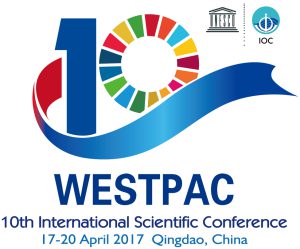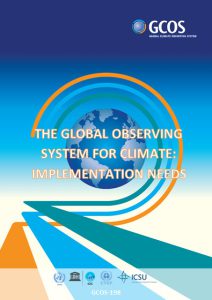Global Ocean Observing System
GOOS is a permanent global system for observations, modeling, and analysis of marine and ocean data.
First Report of the TPOS 2020 project now available
The First Report of the TPOS 2020 project was published on 30 December 2016. This report contains initial recommendations for the Backbone and a synopsis of initial results and plans for the various initiatives of TPOS 2020. The Executive Summary and the full First Report can be downloaded from the tpos2020.org website or from the GOOS Report site. The Executive […]
Read more »15-Dec-2016: New agreement to coordinate a global marine biodiversity observing system
Three major initiatives (GOOS, OBIS and GEOBON MBON) signed a collaboration agreement to join efforts towards a sustained, coordinated global ocean system of marine biological and ecosystem observations to support management decisions and address relevant science and societal needs Globally coordinated and sustained ocean observing system is urgently needed to systematically assess the state of […]
Read more »Call for expert nominations for the Author Team of the Atlantic Ocean Observing System Blueprint 2019
Deadline 6 January for self nominations. Internationally, sustained ocean observation is coordinated through the UNESCO-IOC Global Ocean Observing System (GOOS) which is also a contribution to the Group on Earth Observations (GEO) Blue Planet initiative. But also a number of related programs and projects working to develop and implement effective ocean observing capacities, improving their efficiency […]
Read more »The Physics and Climate advisory panel to the Global Ocean Observing System (OOPC) is seeking experts to serve on the panel.
The Ocean Observations Panel for Climate (OOPC) is a scientific expert advisory group to the Global Ocean (GOOS) and Global Climate (GCOS) Observing Systems and the World Climate Research Program (WCRP). OOPC is a charged with leading the delivery of ocean physics/climate observation requirements, aiding in the development of strategies for evaluation and evolution of the system, […]
Read more »TPOS 2020 Report Open for Public Review
The first of three TPOS 2020’s Project Level Reports is open for public review and comment through October 2016. While the focus and guidance of the Project Level Reports will be on the TPOS Backbone, they will also cover all activities of TPOS 2020, including key initiatives, outstanding science questions, and an indicative timeline for the remaining […]
Read more »
The 10th WESTPAC International Scientific Conference will take place from 17 to 20 April 2017 in Qingdao, China.
This Conference will offer an essential opportunity in the region for marine scientists, ocean institutions and their countries to advance marine scientific knowledge, catalyze multi- and cross-disciplinary collaborations with a view to addressing challenges that countries in this region are facing, including these in achieving the Sustainable Development Goals, particularly the dedicated Goal 14 for […]
Read more »
GCOS Implementation Plan 2016 open for Public Review until 5 September
The GCOS Programme has prepared a new implementation plan in consultation with the global climate scientific and observing community which will be submitted to the UNFCCC for its COP 22 meeting which starts on 7 November 2016, in Marrakech, Morocco. GCOS published its first Implementation Plan in 2004 and updated it in 2010. This 2016 plan is […]
Read more »Earlybird Registration now open for CLIVAR Open Science Conference
DetailsPublished: 07 June 2016 Earlybird Registration is now open through 15 June for the CLIVAR Open Science Conference. The CLIVAR Open Science Conference will take place 18 – 25 September, 2016 in Qingdao, China. The objectives of the CLIVAR Open Science Conference are to: Read more about it on Clivar2016.org
Read more »G7 Science Ministers call for enhanced global ocean observation
G7 Science and Technology Ministers, meeting in 15-17 May 2016 in advance of the G7 summit to be hosted by Japan later this month, issued the Tsukuba Communiqué, recognizing a need for enhanced action for science-based management, conservation and sustainable use of the oceans, seas, and marine resources. It called for enhanced global ocean observation […]
Read more »
Towards Integration of Ocean Observing Networks
Integration was a word that came up often during the development of the Framework for Ocean Observing that now guides GOOS. We realize it has many dimensions in an observing system: across disciplines; parts of the system including oversight, implementation and innovation; from coasts to open ocean; and across different in situ and satellite observing networks. […]
Read more »